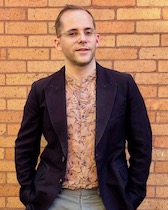Corey Byrnes
Associate Professor of Chinese Culture

- corey.byrnes@northwestern.edu
- 847-467-3314
- 1880 Campus Drive, Kresge Hall, Office 4-548
Corey Byrnes received a BA from Brown University in 2003, an MPhil from the University of Cambridge in 2005, and a PhD from the University of California, Berkeley in 2013. His research and teaching areas include the environmental humanities; 19th-21st century Sinophone literature, film, and visual culture; animal studies; and landscape and spatial studies. He is jointly appointed in the Department of Asian Languages and Cultures and the Alice Kaplan Institute for the Humanities, and is a core-faculty member and Director of Graduate Studies in Northwestern’s Comparative Literary Studies Program. Professor Byrnes is also the co-director of Northwestern’s Kaplan Institute for the Humanities’ Environmental Humanities Workshop, which he co-founded in 2015, and co-lead of Northwestern’s Buffett Institute for Global Affair’s Shifting Shorelines Global Working Group, an interdisciplinary group that seeks to understand and respond to changes in historical and present-day interfaces between land and water.
Professor Byrnes’ first book project, Fixing Landscape (Columbia University Press, 2019), won Columbia University’s Weatherhead East Asian Institute’s First Book Award in 2018 and was awarded honorable mention for the American Comparative Literature Association’s 2020 Harry Levin Prize for outstanding first book in comparative literature. It approaches the 2500-year-long representational tradition inspired by the Three Gorges region of southwestern China from the perspective of the recently completed Three Gorges Dam, which displaced well over one million people and radically transformed the ecology of the Yangzi River. By looking beyond standard narratives about the origins of the Three Gorges Dam project, it locates the dam’s ultimate horizon of possibility in the aesthetic traditions that made the region both famous and central to the political mythology of multiple Chinese states.
His second project is about “cultures of threat”— forms of representation and lived practices through which an imagined future, when feared, comes to seem not only real but imminent—and how they produce unfolding environmental and social futures between the United States and China and across the Pacific. “Cultures of Threat” theorizes the understudied mechanisms of threat by reconsidering the relationship between “rising China” and a global environmental imaginary in which it is treated as an existential threat. Research for “Cultures of Threat” has been supported by a Sydney China Fellowship at the China Studies Centre at the University of Sydney (Spring, 2019), a 2021-2022 residential fellowship at the Radcliffe Institute for Advanced Studies at Harvard University, and a 2023 residency at the Bogliasco Foundation Study Center in Bogliasco, Italy.
Books Fixing Landscape: A Techno-Poetic History of China's Three Gorges (now available from Columbia University Press)
Fixing Landscape: A Techno-Poetic History of China's Three Gorges (now available from Columbia University Press)
Awards
2020, Harry Levin Prize, American Comparative Literature Association - Honorable Mention
2018, Columbia University, Weatherhead First Book Award
Selected Publications
“Chinese and Other Animals, Or, the Limits of the Posthuman,” PMLA,forthcoming
“Comparative Literature at the End of the World?” American Comparative Literature Association State of the Discipline Report, forthcoming
“Imagined Islands and the Potential Nation,” positions: asia critique 32.4 (November 2025)
“Everyday Apocalypse,” in Of Butterflies and Bicycles: A Companion to Wu Ming-yi, Michael Berry and Kuei-fen Chiu, eds. (Cambria, 2025)
“Speculative Landscapes, Promethean Mirages, and Eco-Poiesis,” Made in China, (February, 2023)
“A Cheaper Machine for the Work,” in Proletarian China: A Century of Chinese Labour, Ivan Franceschini and Christian Sorace, eds. (Verso, 2022)
“Men at Work: Independent Documentary and Male Bodies,” Journal of Chinese Cinemas 14.3 (2020)
“Transpacific Maladies,” Social Text 38.3 (Fall 2020)
“The Infrastructure of Coral,” Verge: Studies in Global Asias 6.2 (Fall 2020), Special Issue on Infrastructure
“Chinese Landscapes of Desolation,” Representations 147 (Summer 2019)
“Wu Ming-yi’s Man with the Compound Eyes—Of Changing Seas and a World Made Rich and Strange,” Modern Chinese Literature and Culture Resource Center (online; October 2014)
“Specters of Realism and the Painter’s Gaze in Jia Zhangke’s Still Life,” Modern Chinese Literature and Culture 24.2 (Fall 2012)
